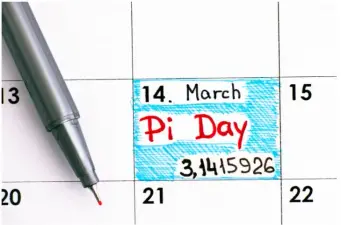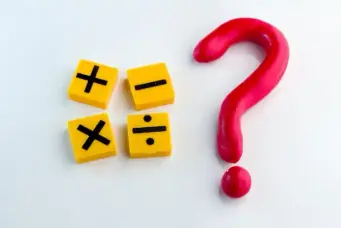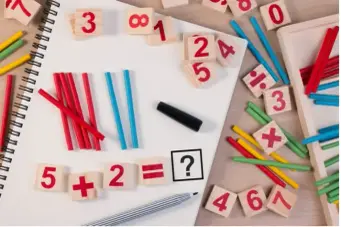
Written By: Katie Smith
March 16, 2022
You’ve set the date, making sure it was prime, for good luck. You’ve sent the invitations, certain to include perfect right angles. You’ve even chosen the music, U2 and Maroon 5, to name a few. You guessed it, NILD therapists…it’s a MATH BLOCK party!
Ok, so perhaps your therapy math block is not quite the affair described; however, just like any party, thoughtful party planning can turn any ½-hearted event into an INFINITE success. By taking the time to view our NILD math block (party!) through the lens of the powerful components of RX 4 Discovery Math, we can build and strengthen number sense, develop math language, and reinforce problem-solving strategies by simply incorporating a few of our favorite RX 4 Discovery Math “party secrets.”
Party Secret #1: Choose an Awesome Party Theme
In RX 4 Discovery Math, we know that theming our session around a “number of the day” provides students with the opportunity to make representational math connections by conceptualizing a quantity in various ways. This, in turn, allows practice for cognitive flexibility, giving students the chance to manipulate that quantity in different contexts in different ways. Just as we can’t wait to experience those quiet and thoughtful details in the perfect soiree, our masterful intentionality planning our math block allows students to discover that there are “number parties” happening ALL around us. Using this theming in your math block provides multiple number experiences and conversations for your student in one session, ultimately building number sense around a quantity that you have carefully planned. What will today’s number party theme bring? The answer lies in what theme you believe your student will RSVP an ecstatic “yes!” Tap into their interests and take the time to include relevancy into your math block. Here are some “number of the day” inspirations:

- A student’s athletic jersey number
- A student’s birthdate
- A student’s height
- The number of days until Christmas
- A favorite author’s age
- The scoring record of their favorite athlete
- The number of siblings at home
- A student’s age
- An upcoming holiday
Party Secret #2: Spark Great Conversations
Have you ever had a conversation with another party guest send you straight to the chips and dip for reprieve? In contrast, an engaging interaction full of energy and depth can make the rest of the room disappear. As NILD therapists, we celebrate Feuerstein’s Mediated Learning Experience (MLE) and the mighty way in which this mediation transforms our students. The reciprocity in our math block and RX 4 Discovery Math requires two important elements from the therapist: great questioning and contemplative listening. One creative, thought-provoking math question can spark curiosity, elicit rich math language, bend rigid thinking, and excite even the most timid party-goer.

In RX 4 Discovery Math, we mobilize our students’ thinking by presenting great math questions, both orally and visually, encouraging students to link math to the world around them. The key to incorporating this mobilization in your math block is developing precise math language, both orally and through written expression. Using a math journal can allow students to examine, review, and reflect upon their OWN math learning experience, driving students toward metacognition. Marilyn Burns reminds us that “by reading their math journals, you can evaluate a student’s progress, and readily recognize student strengths and needs” (Burns 2007).
As an effective party host, it’s imperative that you listen to your guests, engage in the journey that your conversation takes, providing your own insights and anecdotal evidence along the way to guide them towards discovery learning. As diligent therapists, we know that “the insights gained from listening to a child can be invaluable for planning instruction or intervention” (Kling, Bay-Williams 2014). We can elevate our math block parties with active listening as students’ math language unfolds, leading us towards more individualized, targeted intervention.
Party (not-so) Secret #3: Bring on the Fun!
It should go without saying that fun is on the agenda if you attend a party, right? Well, how are YOU infusing fun into your math block? Our RX 4 Math curriculum, gives us many opportunities to incorporate novelty and games. These games reinforce number sense skills learned, assess student progress and transfer of learned skills, and provide team-building opportunities that lessen math anxiety and motivate learners.

Keith Devlin, Stanford University mathematician, is quoted as saying, “Math is not a spectator sport. It’s not a body of knowledge. It’s not symbols in a page. It’s something you PLAY with, something you do”. When a party begins to lull, a great party host knows when to pivot and bring in some fun surprises. Your math games can provide these kinesthetic, entertaining pivots that ultimately challenge your students to creatively problem-solve in a relaxing way. As mathematicians, we must continue to play with quantities and equations ourselves, reminding our students that we should place value on process over product and that productive struggle can also be FUN! You might even incorporate a “Math Games Chart” to pull out during math block, building a game repertoire that student and therapist can refer to and revisit. Reference your RX 4 Discovery Math curriculum guide for party-pumping games such as What’s My Rule?, Four Strikes, I’m the Greatest and many more by Dr. Steven Feifer.
Thanks for the Party Memories
You’ve done it! The last party guest has left, and there is nothing left to do but simplify the trash and clean up those carried digits. Each and every day, we have the incredible honor of creating competent and confident mathematicians through the playful and powerful components of our math block and RX 4 Discovery Math. What magnificent math memories are you creating for your students today?
One last note: Please enjoy this RX 4 MATH demonstration video, including a few of the mentioned party secrets, as well as a girl who DEFINITELY enjoys a great party, my daughter and former NILD student, Charlotte.
https://www.youtube.com/watch?v=1mLDVGYWlfM

Katie Smith, M.Ed., PCET
References
Burns, Marilyn. About Teaching Mathematics: a K-8 Resource. 3rd ed. Saualito, CA: Math Solutions, 2007. Print
Kling, Gina, and Jennifer M. Bay-Williams. “Assessing Basic Facts Fluency.” Teaching
Children Mathematics, vol. 20, no. 8, 2014, pp. 488–497., https://doi.org/10.5951/teacchilmath.20.8.0488.
NILD RX 4 Discovery Math : A Closer Look at Number Sense.